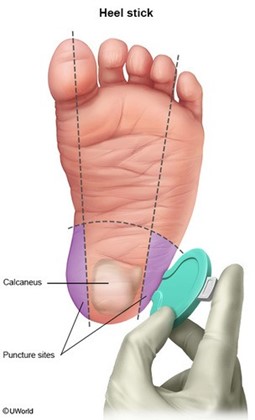A nurse is planning to obtain blood from a newborn via a heel stick. Which of the following actions should the nurse take?
Puncture the heel to a depth of 4 mm to obtain the specimen.
Withhold feeding prior to collecting the specimen.
Apply a heat pack 5 to 10 minutes prior to the procedure.
Elevate the newborn's foot for 15 minutes following the procedure.
The Correct Answer is C
The nurse should apply a heat pack 5 to 10 minutes prior to the procedure when planning to obtain blood from a newborn via a heel stick. This helps to increase blood flow to the area and makes it easier to obtain the specimen.
a) Puncturing the heel to a depth of 4 mm is too deep and can cause injury to the newborn. The recommended depth for a heel stick is 2.4 mm or less.
b) Withholding feeding prior to collecting the specimen is not necessary.
d) Elevating the newborn's foot for 15 minutes following the procedure is not necessary.

Nursing Test Bank
Naxlex Comprehensive Predictor Exams
Related Questions
Correct Answer is A
Explanation
a. Giving broad openings
The nurse is using the therapeutic technique of giving broad openings. This technique encourages the client to freely express themselves and choose the focus of the conversation. By asking, "What has been happening with you today?" the nurse is inviting the client to share their thoughts, feelings, and experiences without imposing any specific topic or direction.
Explanation for the other options:
b. Focusing: Focusing is a therapeutic technique where the nurse directs the conversation to a specific topic or issue. In this scenario, the nurse is not guiding the client's response toward a particular area of discussion.
c. Reflecting: Reflecting is a therapeutic technique where the nurse repeats or paraphrases the client's words or feelings to demonstrate understanding and encourage further exploration. The nurse's statement in this scenario does not involve reflecting the client's words or feelings.
d. Seeking clarification: Seeking clarification is a therapeutic technique used to obtain more specific information or clear up any confusion. The nurse's statement in this scenario does not involve seeking clarification from the client.
In summary, by using a broad opening, the nurse allows the client to choose the focus of the conversation
and encourages them to share their experiences and concerns.
Correct Answer is A
Explanation
The nurse should include the instruction to "verify the identity of anyone who wants to remove your baby from the room" in the teaching about security procedures. It is important for parents to be vigilant and ensure that only authorized personnel have access to their baby.
Option b is incorrect because it may not be safe for the parent to leave their baby unattended in their room while they walk in the hallway.
Option c is incorrect because newborns typically have two identification bands, one on their arm and one on their leg.
Option d is incorrect because parents should not leave the unit with their baby without proper authorization and discharge procedures.
Whether you are a student looking to ace your exams or a practicing nurse seeking to enhance your expertise , our nursing education contents will empower you with the confidence and competence to make a difference in the lives of patients and become a respected leader in the healthcare field.
Visit Naxlex, invest in your future and unlock endless possibilities with our unparalleled nursing education contents today
Report Wrong Answer on the Current Question
Do you disagree with the answer? If yes, what is your expected answer? Explain.
Kindly be descriptive with the issue you are facing.
